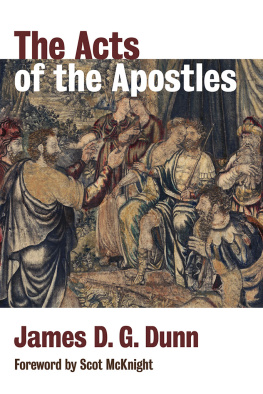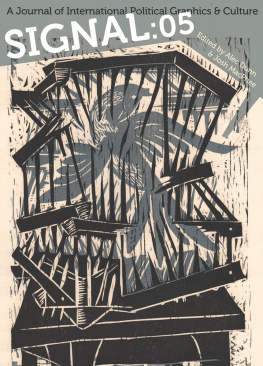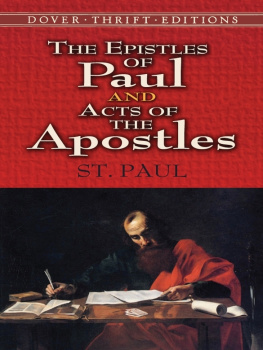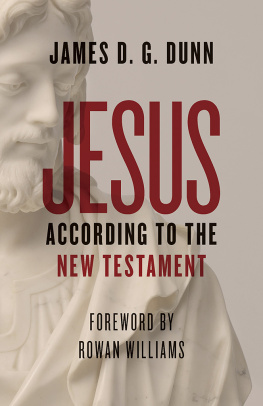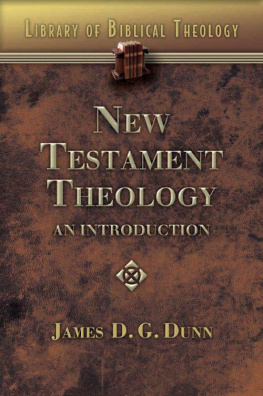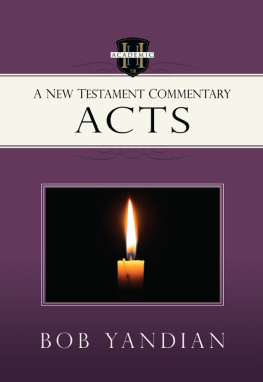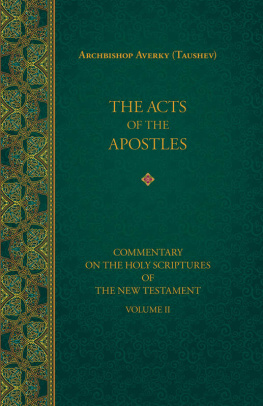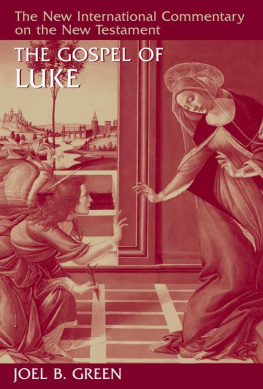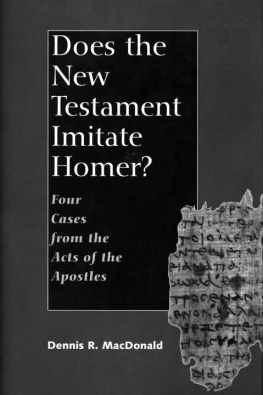The Acts of the Apostles
James D. G. Dunn
WILLIAM B. EERDMANS PUBLISHING COMPANY
GRAND RAPIDS, MICHIGAN
Wm. B. Eerdmans Publishing Co.
2140 Oak Industrial Drive N.E., Grand Rapids, Michigan 49505
www.eerdmans.com
1996 James D. G. Dunn
All rights reserved
First published 1996 by
Epworth Press, Peterborough U.K.
Eerdmans edition published 2016
ISBN 978-0-8028-7402-3
eISBN 978-1-4674-4606-8
22 21 20 19 18 17 16 1 2 3 4 5 6 7
Library of Congress Cataloging-in-Publication Data
Names: Dunn, James D. G., 1939- author.
Title: The Acts of the Apostles / James D.G. Dunn.
Description: Grand Rapids : Eerdmans Publishing Company, 2016. |
Originally published: Valley Forge, Pa. : Trinity Press International, 1996.
Identifiers: LCCN 2016019031 | ISBN 9780802874023 (pbk. : alk. paper)
Subjects: LCSH: Bible. ActsCommentaries.
Classification: LCC BS2625.53 .D86 2016 | DDC 226.6/07dc23 LC record available at https://lccn.loc.gov/2016019031
Extracts from the Revised English Bible are 1989 by the Delegates of the Oxford University Press and the Syndics of the Cambridge University Press and are used by permission.
Contents
Some years back I was invited to Rustenberg in South Africa to preach a series of sermons during Pentecost. In preparation for that series, I landed upon one of my favorite quotations about the Holy Spirit and made it central to the sermon series. I found the quotation to be from my doctoral supervisor at the University of Nottingham, James D. G. Dunn:
The Spirit of God transcends human ability and transforms human inability.
When I wrote down the quotation in order to use it as an important reminder in each of the sermons, rather than recording the source of the quotation carefully, as I would have done if writing a book, I jotted it down in the margin of my notes for the first sermon. Unfortunately, that page got wet, and the citation went invisible behind a smear of the ink from my fountain pen. Later, when I was writing a book in which I wanted to use that quotation again, I spent a couple hours combing through one Dunn book after another and then spent more time in one of them, convinced as I was that it came from Jimmys big fat book on Pauls theology. It was not to be found, and it was frustrating because I had put the line to memory (not that I didnt have to pause at times to make sure I got it right).
My last effort to locate the precise spot was to write to Jimmy and see if he could recall where he had written the line. His response:
Good question, but one I cant recall. I said quite a lot along the same lines in Jesus and the Spirit, and probably also in my early ExpT pieces on Rediscovering the Spirit (1972, 1982), which come from our time together in Nottingham, when it is likely that you heard me on the subject. Sorry I cant be more help.
His response still makes me chuckle, for if the author cant remember his own lines, how could I? I gave up, hoping I could somehow rediscover the source as I continued to work on the writing project. One day I was wandering through my commentaries on the book of Acts when I saw Jimmys little commentary. It triggered a memory that I may have found that golden quotation in this book, and within a few minutes, on page 12, I found the citation. I now give it in full, because for me this statement represents both the theology at work in the book of Acts and the kind of scintillating insight one finds in Dunns commentary:
The prominence of the Spirit in Lukes narrative from Pentecost onwards makes clear beyond doubt that for Luke the mission of the church could not hope to be effective without this empowering from God (the Spirit of God) which transcends human ability and transforms human inability.
So true. The Spirit empowers us to do well beyond what we could do on our own, and what we are already gifted at Gods Spirit transforms to the glory of God.
On my shelves of books about Acts I have three humungous sets a four-volume commentary, a five-volume study of Acts, and another five-volume set. I have more than one two-volume commentaries on Acts, but in this little commentary by Dunn you have insight, measured judgment about history and theology and context, and suggestions that take the preacher to the heart of what the book of Acts can mean for us today. I always begin any study of any passage in the book of Acts by pulling off Jimmys commentary. I go to the others when Im done, but often enough I get all I need in Dunn.
Each time I read in this commentary I recall incidents over a cuppa in Jimmys office at Nottingham when he would go over my thesis project line by line, or his e-mails to me about the thesis when he had moved on to Durham, or one dinner after another we have shared at the Annual Meeting of the Society of Biblical Literature. Funny how such a small commentary can contain so many memories. But thats because in his The Acts of the Apostles you will hear the voice of one of our generations greatest scholars and Christian mentors of scholars who now populate the globe, which is precisely what the book of Acts propels us to be!
Scot McKnight
Julius R. Mantey Professor of New Testament
Northern Seminary
The Acts of the Apostles is the most exciting book in the New Testament, probably in the whole Christian Bible. It tells of the beginnings of Christianity with a vigour and vividness which often leaves the new reader breathless. It is a story of men (almost entirely men) who are filled with divine power, inspired to speak with an effectiveness far beyond native ability, guided and sustained at crucial moments by heavenly visions, their mission punctuated by miraculous healings and rescues, their initial success staggering and their progress to the centre of the civilized world (Rome) remorseless. Its particular hero and the one whose character is most clearly drawn is Saul who becomes Paul, persecutor become advocate, Pharisee become apologist, ardent Jew become missionary to Gentiles. His conversion, his travels and many crises, his preaching and encounters, disappointment and success, even his long drawn out defence in the final chapters, is the stuff of adventure yarns.
Acts is a book which even today still stirs the passions when read in Christian congregations and groups, evoking the same mixed responses that Pauls own message received: some being persuaded by what is said, others disbelieving (28.24). Some sighing, Oh that the church today could know again the same empowering of the Spirit. Others doubting, Could it really have been as Acts narrates? The rest probably somewhere in between, wondering how comfortable or disconcerted they would be should either alternative prove to be the case. But few, surely, can remain unimpressed or unmoved by the Acts account, whether as a superb adventure tale or as a historical narrative, in its portrayal of a Christianity which excites and provokes. Is this Christianity as it really was in the beginning, as we should continue to envisage it, or even as it should be?
What is this book then? What do we need to know about it before we can read it to best effect?
1 The author, recipient, date and text of Acts
The book does not tell us who its author was; in this it is more like the Gospels than the Epistles in the New Testament. From earliest times, at least from the end of the second century AD, the tradition has been that the author was Luke, the one described as the beloved physician in Col. 4.14 (cf. II Tim. 4.11; Philemon 24). The evidence available to us from Acts does not enable a firm judgment on the point. But there are two features within the document itself which are particularly relevant.

